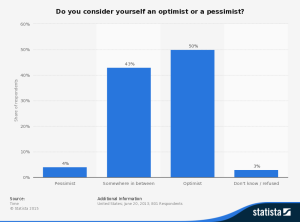Are you as frustrated and confused as I am about all the latest health fads?
It’s hard to know what to believe when you see an article online telling you what you need to eat/drink to build up your immune system, only to find out after reading it that many of the items mentioned were on last week’s article about what not to consume if you want to be healthy. With gluten free being the latest craze, it’s not enough that you have to see gluten free labels on foods that have always been gluten free. Gluten free peanut butter or ice cream anyone? You also are constantly being bombarded with all the pros and cons on being gluten free and how it may or may not have an adverse effect on your health. Well, all those articles have gotten a bit corny if you ask me!
How about if you I were to tell you that you actually have the ability to increase your overall health by having the right personality trait?
And that by changing the way you think, you can actually improve your health and prolong your life?
Studies around the world have shown this to be true since the mid 1980’s yet it seems to have been forgotten in today’s world.
Are you ready to get back in the driver’s seat with your health and not fall victim to all the latest conflicting health related articles? I’ve put together a short read on what the personality trait is and also included a brief questionnaire to see if you are in the 50% category of the population who claim to have it. Not to worry if you don’t, there’s a very simple way you can get there!
 What is this personality trait?
What is this personality trait?
Dictionary.com defines optimism as:
1) A disposition or tendency to look on the more favorable side of events or conditions.
2) The belief that good ultimately predominates over evil in the world.
3) The belief that goodness pervades reality.
4) The doctrine that the existing world is the best of all possible worlds.
Earlier this year, Time Magazine published an article referencing two studies that found those with high levels of optimism had twice the odds of being in ideal cardiovascular health compared to those who are more prone to being pessimistic. This finding confirms a Harvard study in 2012 that showed optimism reduced the odds of heart attack and stroke. Dr. Martin Seligman was onto the health benefits of optimism in the early 1990’s when he first released Learned Optimism where he shared research that showed optimism could boost your immune system. And yes, you read the title correctly, it’s a learned behaviour which means this is yours for the taking!
In Dr. Seligman’s more recent book, Flourish, he reiterates his view on optimism, linking it to studies that show it provides a reduced risk of cardiovascular diseases as well as colds and flus.
Who doesn’t want to be at a lower risk of cardiovascular diseases and getting the common cold? A healthy body = a healthy mind!
With today’s focus on health, I found this recent survey to be interesting as it shows participants are pretty much even between viewing themselves as an optimist or as being somewhere in between (aka “realists”). While this graph is based on the US population, I am not sure that the statistics would be that much different in Canada.
I am known as being the incurable optimist and I cannot recall ever having NOT had a positive outlook on life, even as a child. Interestingly enough, many years ago I put my family to the test with this quick learned optimism quiz and was surprised when the results showed I was the only one in my family with this outlook!
I feel having a positive outlook played a huge role in propelling me in my healing and rehabilitation journey after sustaining a traumatic brain injury. Looking at the glass as being half full always kept me motivated to never stop reaching for my next goal, as difficult as it may have been.
If you view yourself in any of the following ways the majority of the time, chances are you are also an optimist:
– You believe in yourself.
– You make the most of all opportunities.
– You have a deep sense of gratitude.
– You believe in those around you.
– You use positive self-talk to motivate yourself into action.
– You choose not to blame others.
– You practice forgiveness (not to be confused with forgetting.)
– You don’t let bad experiences taint your view of what the future may hold.
While we can all experience those brief moments where a negative event may get the best of us momentarily, if the above are your signature traits then I’d like to roll out the red carpet and welcome you to Club Optimist!
If you find that you are on the opposite end or perhaps riding the fence in the middle, have no fear, it’s not too late for you to turn things around. Prevention Magazine has put together a little cheat sheet that will help you get started and it’s appropriately titled the pessimists guide to being optimistic!
Optimists are known to be healthier, happier and more successful than those who are more negative There are two ways to look at life, the glass is either half full or half empty. How does the glass look from your viewpoint?













Great comments, Denise. These words are good reminders about the power of hope. Thanks to you too for encouraging me to meditate regularly for the first time in my life! I signed up for the Deepak/Oprah 21 day meditation course. Thanks for inspiring me.